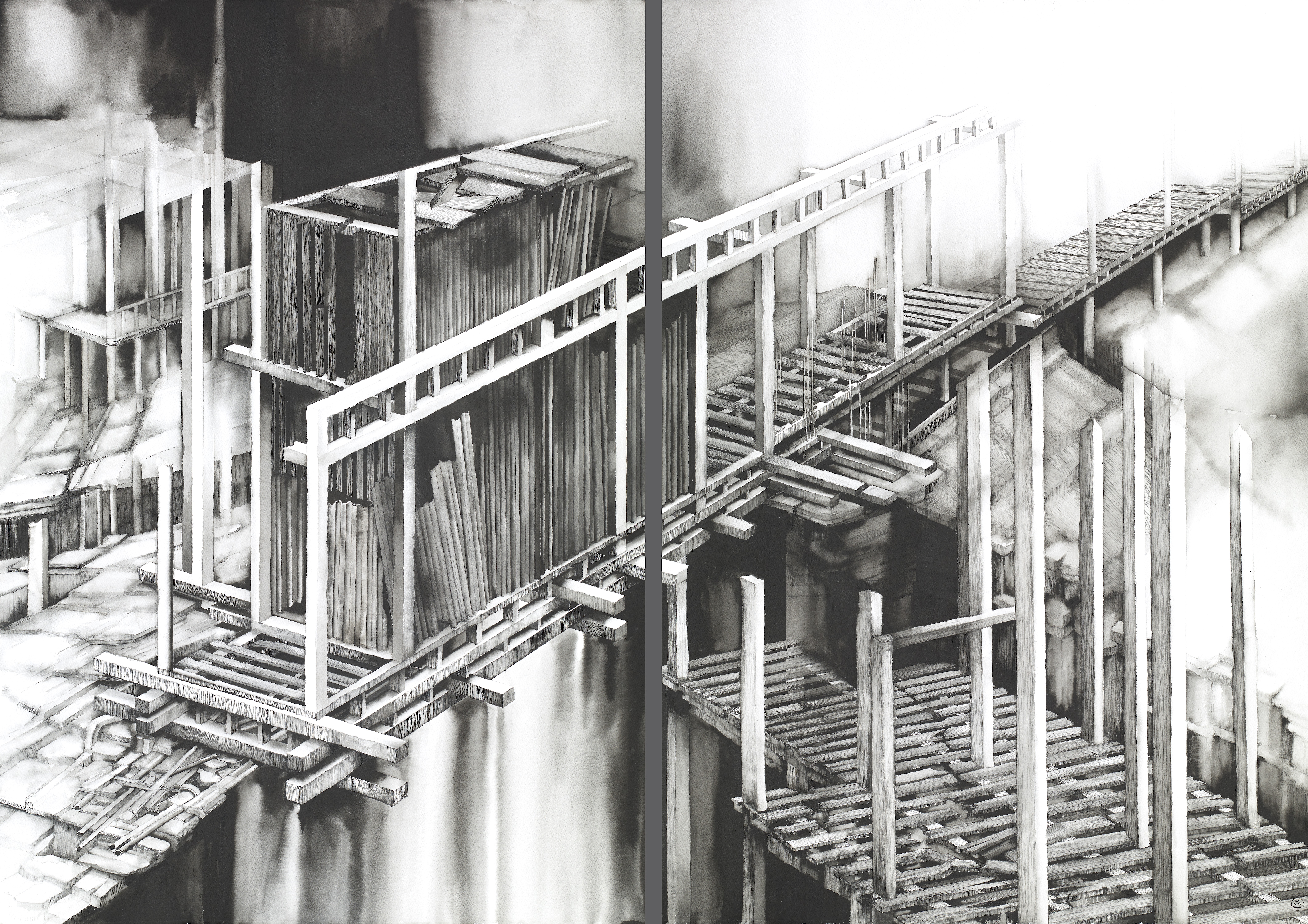Crossing the Abyss
This text, first published in Women Writing Architecture (2021), introduces a new series by artist Deanna Petherbridge in which she will comment on a number of her recent pen and ink drawings. The drawings use imagined architectural imagery as a metaphorical means to deal with complex subject matter about social and political issues.

The language of architecture has always served my drawing practice as a metaphorical means to deal with complex subject matter. Primarily I employ invented imagery alluding to the built and engineering environment as an over-reaching metaphor for the people and societies who construct, inhabit, control, embellish or destroy such habitations, edifices, towns and cities. Simultaneously I manipulate the geometries and encoded linear systems of spatial and perspectival architectonic representation as a malleable infrastructure to be deployed for deliberate visual effects and affect in expressing ideas that are more commonly explored through word and text or moving imagery.
This is the background to a brief discussion of my two-part drawing Crossing the Abyss, which was produced in the hysterical and globally disruptive year of 2019 that preceded the pandemic – almost as if disruptive political demagogy across an interconnected world gave birth to the subsequent dark occult events that we’re still living through. This was the year that in the UK was dominated by issues of Brexit, the specious arguments of a deeply dubious campaign and Boris Johnson’s proroguing of Parliament (August/September 2019), which shook historical notions of the solidity of British democratic systems to the core. His scenario was playing to a discomfited Europe while Donald Trump was spewing out disinformation in a maniacal campaign that would eventually lead to the attack on the United States Capitol of 6 January 2020. And that’s just the short list of challenging events engendered by elected heads of state! In 2019, so-called ‘populist’ politicians and corrupt dictators were dispensing lies and bad government, and undermining democracy in countries across the world, while mounting wars of attrition on their own populations. That’s not to mention disregarding or trying to distract people from the massive underlying threat of global warming and environmental crisis.
So, Crossing the Abyss was my own way, as an artist, of coming to terms with global issues that seemed to me so very important for the now and the future. Without describing it in tedious detail, I believe that the imagery of this double panel drawing openly alludes to rotting bridges and stepped pathways crossing floods and chasms; disintegrating wooden piles and dangerous platforms; insecure stretches of rocky but undercut landscape; rusting and collapsing walls of corrugated metal. Bridges, paths and roads signify passage and movement, so such evocations were designed to lead spectators to contemplate threatening narratives of time, dissolution and change. The edges of the terrain within the frame are unclear, with the intention of obscuring whether the fragile built structures, here symbolic of threatened societies, grow out of, or decay back into, a deteriorating environment. I hope that some of these intentions are manifest to viewers.
Somehow – and it’s never possible to describe how it happens – visual imagery initially hovers in the imagination, then transfers itself to the page and develops in unpredictable ways. Making art is a hazardous but lively undertaking, with curious ‘conversations’ taking place between a developing work and its fraught progress. As my detailed drawings take an awfully long time (two to three months at least, with the risk of the endgame being disastrous!), I wasn’t even sure whether I’d make it to the finish. But, of course, completing a drawing is not intended as the closure of a project … just a moment in an ongoing and now very politicised practice.
